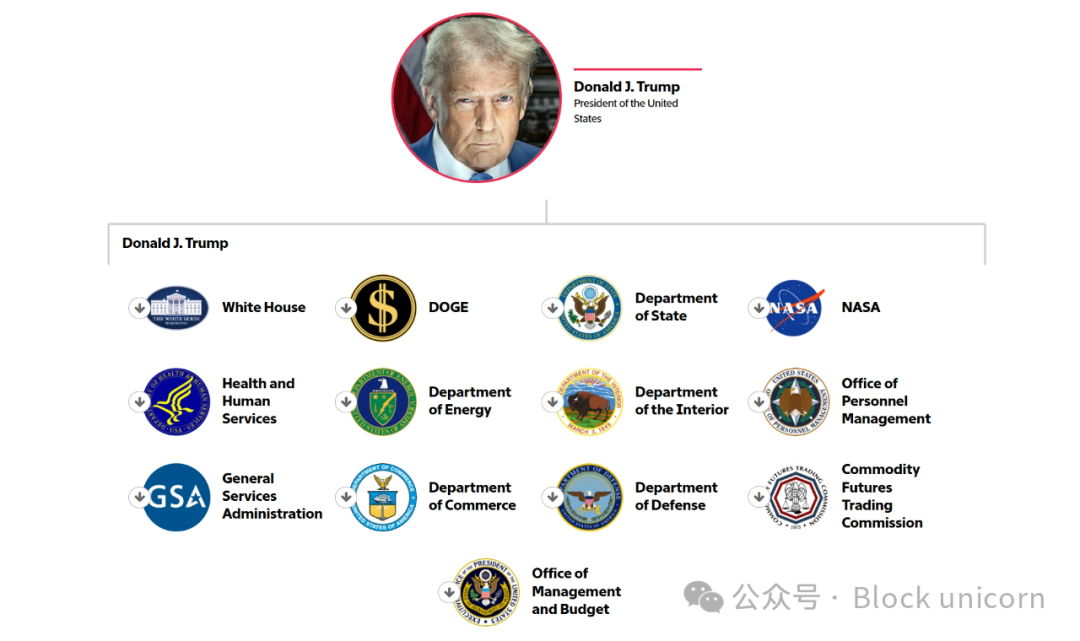Silicon Valley is "invading" Washington: Which technicians are subverting the US government?

Reprinted from panewslab
02/19/2025·2MArticle Author: Julia Black
Article translation: Block unicorn

Preface:
- Several Trump administration’s technology appointees have served in previous presidential administrations, including Michael Clazios (Donald Trump’s first term), Abel Sutton (Donald Trump’s first term) one term) and Jim O'Neal (George W. Bush period).
- Elon Musk's government efficiency department recruited former employees from Musk's company, some of whom were only 19 years old.
- Many of the Trump administration’s technical appointees and advisers are important donors to its campaign, including Musk, Mark Anderson, Jacob Herberg and David Sachs.
Silicon Valley is "invading" Washington
So far, Silicon Valley’s “invasion” of Washington has mostly focused on how Elon Musk and a group of young technologists at the company thoroughly investigate the federal government and look for waste. However, employees from other companies in Silicon Valley also play a major role in the Trump administration.
In fact, you can almost call this government the “A16Z Government.” In our organizational chart, more than 24 top technologists on the Trump team are presented, including four current or former A16Z partners who have formal or informal roles in the Trump administration. This includes co-founder Mark Anderson, who is an advisor to the government efficiency department led by Musk, and Scott Cooper, who serves as director of the Office of Personnel Management.
Trump plans to nominate A16Z’s head of crypto team policy, Brian Quintendz, to lead the Commodity Futures Trading Commission, said on X on Wednesday morning. Meanwhile, the company’s Jamie Sullivan is also assisting the government’s efficiency division, while former A16Z partner Sriram Krishnan is an AI consultant at the White House. According to several people familiar with the matter, the A16Z has such a deep influence in the government that members of its talent team are helping to recruit government staff.
The company's involvement once again highlights the sharp rise in high-tech's influence on the U.S. government over the past month. This is particularly evident compared to Trump's first presidency, when he was openly clashing with the technology industry over issues such as immigration and content review.
But as his re-election campaign advances, Trump begins to show that his interests are increasingly converging with Silicon Valley—including funding large AI projects, relaxing regulation of crypto markets, overhauling defense procurement, and reducing red tape for biotech entrepreneurs.
At the forefront are Musk and his government’s efficiency department employees who travel between federal agencies and their technical systems to conduct a comprehensive audit and recommend layoffs. Musk's deputy — including Steve Davis, Jayne Balahadia and Amanda Skeles — has withdrawn from the day-to-day work of The Boring Company and xAI to assist the government's efficiency department work.
Of course, operating the country at the speed of startups means Musk and his team ignore issues about conflicts of interest, handling sensitive private data and even the legitimacy of their behavior. Musk appeared in the Oval Office with Trump on Tuesday, and the president signed an executive order that cemented the responsibilities of the government's efficiency department.
When asked by reporters about the potential conflicts that his numerous business interests may cause, Musk did not answer the question, but responded: "All our actions are the most transparent. In fact, I don't know which organization is better than the government The efficiency department is more transparent.”
There are signs that more people from the tech industry will continue to join the federal government. Last week, the Office of Personnel Management released a memorandum announcing the re-designation of senior executive services and CIO positions from career positions to political appointments. This change could open the door to these positions for non-traditional candidates from the tech and business sectors.
The A16Z is not the only investment company that has left its mark in the government. Founded by Palantir co-founder Joe Lonsdale, 8VC is drafting policy memorandums such as a recent healthcare report that appear to be the blueprint for the new administration. And a series of investment companies by Peter Thiel have become "gilded schools" for senior officials, including Vice President JD Vance.
There are already signs that some tech and business figures may not last long in government positions. Entrepreneurs including Vivek Ramaswami and Loom co-founders Shahed Khan and Vinay Shiremat were all leaving within weeks of joining the government’s efficiency department.
Currently, some technologists have expressed their excitement of sudden control of government power. Early Roblox employee John Sedletsky recently summed up this sentiment on X: "Silicon Valley builds the modern world. Why can't we control it?"


 chaincatcher
chaincatcher